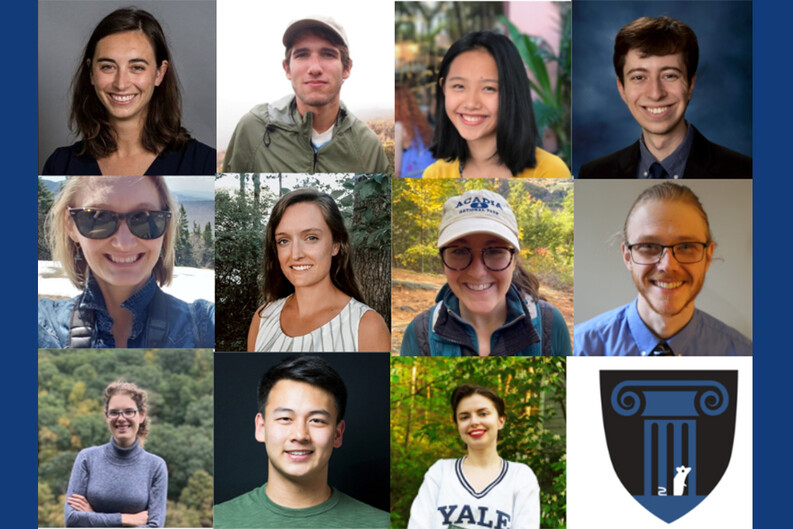LEAP Announces 10 Student Grant Program Recipients for 2022

The Law, Ethics & Animals Program (LEAP) announced 10 recipients of the LEAP Student Grant Program from across Yale University.
The Law, Ethics & Animals Program4 (LEAP) at Yale Law School is thrilled to continue the LEAP Student Grant Program5 this year. Chosen from a highly competitive applicant pool, 10 students from across Yale are embarking on projects that build understanding of, draw attention to, and/or develop new strategies to address the urgent threats facing nonhuman animals. This year’s set of awards will support multidisciplinary projects in law, policy, art, science, historiography, investigative journalism, and more. The 2022 LEAP Student Grant recipients include:
- Annie Crabill, an M.A. student at the Jackson Institute for Global Affairs, interviewed politicians in Lyon, France who have introduced a plant-based school lunch program and maintained it in the face of public pushback. She plans to publish her work as a long-form article.
- Diego Ellis Soto, a Ph.D. candidate in Ecology and Evolutionary Biology, is creating music using machine learning technology to map animal motion into sound. LEAP’s grant will support Soto’s work to create a proof of concept for converting animal behavior into immersive music and art. He is displaying this work at art galleries at Yale in 2022, and will publish a scientific paper.
- Robin Happel ’23, a J.D. candidate at Pace Law School and a M.E.M. candidate at the School of the Environment, plans to work with the Appalachian Mountain Advocates, an NGO in West Virginia, on litigation strategies to combat the environmental harms of confined animal feeding operations in the region.
- Zack Steigerwald Schnall, a M.E.M student at the School of the Environment, will conduct a survey to determine how humans assign moral worth and economic value to other species, as well as public understanding of harms to animals and the environment. From these results, he will create a value of statistical life for nonhuman animals, which cost benefit analyses will be able to use going forward. The results of this study will be compiled and synthesized in a report which will be submitted for publication.
- Meredith Barges, a M.Div. student at the Divinity School, is launching a new student organization to advocate for bird-friendly changes to Yale’s practices and policies: bird-friendly building design to reduce collisions, lighting changes to protect dark skies and reduce migratory hazards, cessation of the use bird-killing rodenticides and pesticides, and the propagation of bird-friendly plants on campus.
- Kristy Ferraro and Nathalie Sommer, Ph.D. candidates at Yale and former grant recipients, are continuing their work publishing on the philosophy of conservation. The research funded by this project will update two foundational ethical assumptions in conservation: that conservation should value groups and ecosystems above individual animals, and that anthropomorphism has negative value in conservation science.
- Francis Commercon, an M.E.Sc. candidate at the School of the Environment, is conducting a case study in how the discovery of endangered shorebird populations led to updates to Chinese wetland conservation policy. Through interviews, the investigation will shed light on the interaction between ecology and Chinese environmental policy making.
- Rosalyn Leban ’24, a J.D. candidate, is creating podcasts, audio-interviews, and oral histories with the residents of Ometepe, Nicaragua. Her work will consider the connections between and interdependence of humans, non-human animals, and non-nimal life on the largest island in a freshwater lake in the world.
- Kevin Yang, an M.A. candidate at the School of Architecture, will design and build model structures to encourage human-animal cohabitation in urban environments, in collaboration with the Yale Peabody Museum of Natural History and the Yale-Myers Forest. These deployable structures will serve as shelter for animal refugees whose habitats are threatened by human activity, and showcase the genius and plight of wild animals.
- Emily Tian, Yale College B.A. ’23, is researching and writing a longform journalism piece about California’s Proposition 12 law, a 2018 ballot initiative that was approved by 60% of the state’s voters and that requires improved housing conditions for farm animals, and the legal challenges it now faces. She will discuss how farm animal welfare has been perceived in public debates about the law.
Read more about the 2021 cohort of LEAP student grantees6 and learn more the LEAP Student Grant Program on LEAP’s website5.


